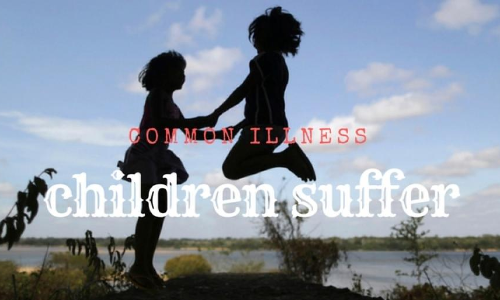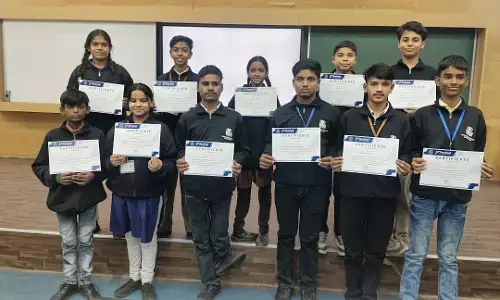For that happy smile

Parents want their children to stay as healthy as possible, but reality is far from this. Children and infants are most susceptible to infections.
Children and infants are most susceptible to infections. Here is a list of common ailments in children and their preventive measures, which will keep your ward hale and hearty
Parents want their children to stay as healthy as possible, but reality is far from this. Children and infants are most susceptible to infections.
The immune system of infants and younger children is not completely developed, and hence they are constantly battling a series of infections, which they are exposed to almost daily.
Among school going children, the chances of contracting an infection is higher, as majority of the common illness are infectious and easily passed on.
Below are some of the common illness children suffer from and some ways to prevent them:
Cold and flu
This is one of the most common and infectious illness children suffer from. On an average, school going children contract a cold at least around 6-10 times a year, which can last anywhere from a few days up to two weeks.
Preventive measures: Influenzas vaccination will protect the child from influenza but not from other respiratory viruses. Children should be taught to cover the nose and mouth while sneezing or coughing. Handwashing is the most important method in prevention of cold. Children should be taught to wash their hands before and after meals, after playing with other children or pets, before and after wiping the nose, etc. In case of small children, the toys which they are likely to put in the mouth should be washed and cleaned regularly.
Hand, Foot, Mouth Disease (HFMD)
Hand, Foot, Mouth Disease (HFMD) is one of the common diseases among infants and children below the age of 5, as they do not have the immunity to fight the viruses that cause HFMD. It is a viral and infectious illness. Some symptoms to look out for include fever, rashes on the hands and feet as well as painful sores in the mouth.
Preventive measures: Till date there is no vaccine for HFMD. But the risk of contracting it can be reduced by frequent washing of hands. Additionally, ensure that your children do not share their food and avoid close contact with others who are infected. Disinfecting the house, the child’s toys and other household items is another way of prevention if the child has come in contact with an infected person.
Conjunctivitis
Conjunctivitis is a common and uncomfortable eye condition that can be caused by viruses, bacteria and irritants. It causes redness of the eye as well as a white discharge from the inner eyelid.
Preventive measures: The most practical way to avoid conjunctivitis is to inculcate the habit of washing their hands frequently with warm water and soap, in your child. Also make sure, they do not share towels, clothes etc. with someone who is infected. In case this cannot be prevented, make sure to disinfect the items in order to avoid spreading conjunctivitis.
Stomach flu (Gastroenteritis)
Stomach flu is an infection of the digestive system, which is generally caused by germs and is not related to the common flu. It is medically termed as gastroenteritis. It causes an inflammation of the digestive tract, which leads to diarrhoea, vomiting and fever.
Preventive measures: As stomach flu is highly infectious; it is advised to keep children from coming in contact with an infected person. Teach your children to wash their hands as often as possible, especially after using the restroom and before meals. Avoid feeding small children street food as the water could be contaminated and their bodies not developed to handle it. Another good habit is to discourage them from putting their fingers in their mouths without thoroughly washing them first. Wash all fruits and vegetables before eating them. Meat should be cooked well. Vaccination against rotavirus, which is one of the most common causes of stomach flu can be given after consultation with your paediatrician.
Ear infection
An ear infection is an inflammation of the middle part of the ear, usually caused by germs, that develops when fluid builds up behind the eardrum. Ear infections in children are one of the most worrisome conditions for both parents and children, especially if they are recurring.
Preventive measures: Studies have shown that babies who are around smokers are more prone to ear infections. Hence it is best to avoid smoking around children. Follow the vaccination schedule as prescribed by your paediatrician. Avoid bottle feeding the baby when he/she is lying down.
Whooping cough
Whooping cough is a bacterial infection that causes inflammation of the lungs and airways. The name is derived from the birdlike "whooping" sounds that children who have the illness typically make when they’re trying to take deep breaths between coughs.
Preventive measures: The best way to prevent whooping cough is to vaccinate the child. Whopping cough can be dangerous in babies and children under the age of 18 months who have it should be constantly monitored. Continuous coughing could cause breathing problems in children. Whooping cough is extremely infectious. Wash your child’s hands before consuming food or in case they come in contact with the infected person. Teach them to cover the mouth while coughing and sneezing to minimize the spread of germs.
Chickenpox
Chickenpox often starts with a cold, along with a running nose and cough, followed by the appearance of rashes a few days later. These rashes and outbreaks are quite itchy and uncomfortable.
Preventive measures: The best way to prevent chickenpox is to vaccinate children against it. Vaccinating children with two shots before they turn thirteen is advisable. In case if one contracts chickenpox even after being vaccinated, there is no cause to worry, as in these cases the illness is usually mild.
Although these are the more common ailments children suffer from, parents need to be alert and keep an eye out for tell-tale signs of an infection. While common preventive measures can help reduce the severity of an infection, each child’s body functions differently and it is best that parents consult a paediatrician on a case to case basis.
By: Dr Santosh Datar, Ziqitza Healthcare Limited.
















